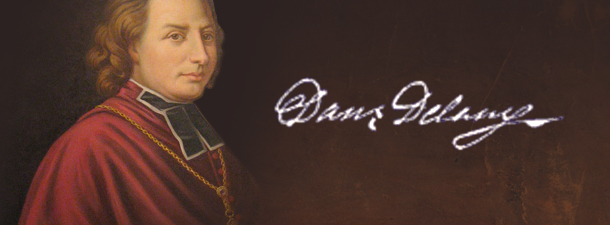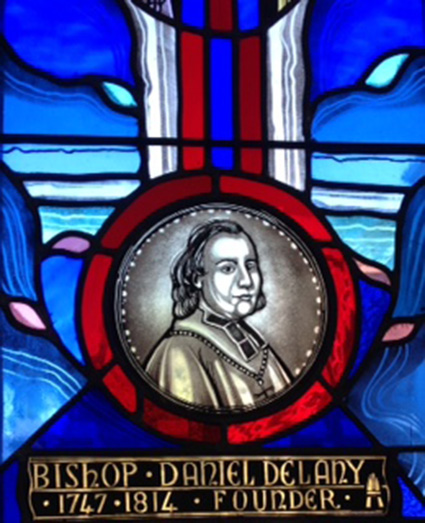Bishop Daniel Delany
In 1747, Daniel Delany was born to Daniel and Elizabeth Delany (nee Fitzpatrick) in Paddock, County Laois, in the Diocese of Ossory. The Delany and Fitzpatrick families were wealthy farmers, unlike the majority of Catholic families of the time.
Such was the Ireland into which Daniel Delany was born in 1747; and such was the desolate, national miasma in which he spent his early years. Fortunately, his parents and his two exemplary aunts were firm Catholics. They passed on to the young Daniel the truths of the faith, the richness of his land’s traditions, and a deep thirst for knowledge. They also taught him to be sensitively aware of the sufferings that surrounded him in his native locality near Mountrath, in the county of Laois.

In 1763, at the age of sixteen, Daniel Delany decided to become a priest. With the help of a good Protestant friend he was smuggled out of the country to a college in Paris to begin his studies for the priesthood. He earned a reputation for his intellectual brilliance and his marked sensitivity of disposition. In 1770, Daniel Delany was ordained a Priest – significantly the year that Captain Cook entered Botany Bay.
Daniel returned to Ireland, disguised as a layman since priests were outlawed. Early Brigidine writings tell us that Daniel was shocked at the conditions that still prevailed in Ireland. Destitution, violence, lawlessness and crime were rampant throughout the country. There was widespread agrarian unrest as millions of landless poor struggled for the rights and privileges of practical ownership. The country was still fettered and unfree despite the relaxing (but not total lifting) of the penal laws. He was so appalled at the state of Ireland that he was tempted to return to France. However, his mother prevailed on him to stay in Ireland.
More on Daniel Delany’s story and the early history of Brigidines from, From the Acorn to the Oak.
Appointment in Tullow
His first appointment as priest curate was to Tullow at the end of 1777. The social and political conditions that prevailed in Tullow were harsh and intimidating. Crime, violence and vice flourished in Tullow and in the surrounding areas.
In response to these conditions, he organised Sunday school for adults as well as children. He tried sermons and house-to-house visitation. He enlisted the help of the wives and mothers in trying to remedy some of the deplorable behaviour in the parish. He didn’t meet with much success, so he turned his attention to the youth.
Music and Singing
Daniel gathered some children and started a choir, teaching them to sing at Mass and at Vespers. From hymn singing he progressed to prayer and religious instruction. He taught the more gifted to play the whistle and flute and he started an amateur band. He initiated catechetical classes for first communicants and those preparing for confirmation. Music and singing attracted both children and adults to the chapel. The numbers for instruction grew and the beginnings of a Sunday School system took shape.
From Curate to Bishop
As the youth learned to sing and read, they acquired a new sense of dignity and classes were formed. The numbers increased so much so that Daniel Delany had to enlist the help of young women and men whom he trained with great care. Before long, students of all ages, both single and married, were attending Sunday school. The parish of Tullow was slowly being transformed. Daniel Delany was curate for only six years when he was appointed coadjutor to Bishop O’Keeffe in 1783.
Bishop Delany’s vision of providing secular as well as religious education for his people, “rich and poor alike,” impelled him to explore the possibilities of founding a religious order. As always, he found the answer to his difficulties in prayer before the Blessed Sacrament.

- Love God and live together in peace and charity.
- Do everything in a spirit of holy love and you will not find your hands empty at journey’s end.
- It is not, my dear children, God’s consolations but God himself you should seek.
- What you are those who come after you will be: the fountain should itself be pure in order to have the stream pure.
- From every seed sown and cultivated by pure love we shall be sure to reap a harvest of endless glory.
- Never entertain yourself or others in speaking of another’s faults or failings. You should be no less careful to draw a veil over these than if they actually belonged to yourself.
- For you holiness will not consist in doing great actions, but in doing your least actions with great purity of intention and a genuine desire to please God.
- By performing the ordinary duties of your day well you will perfect yourself, and your day will be full of merit and good works.
- The Cross is the sure way to find Christ.

